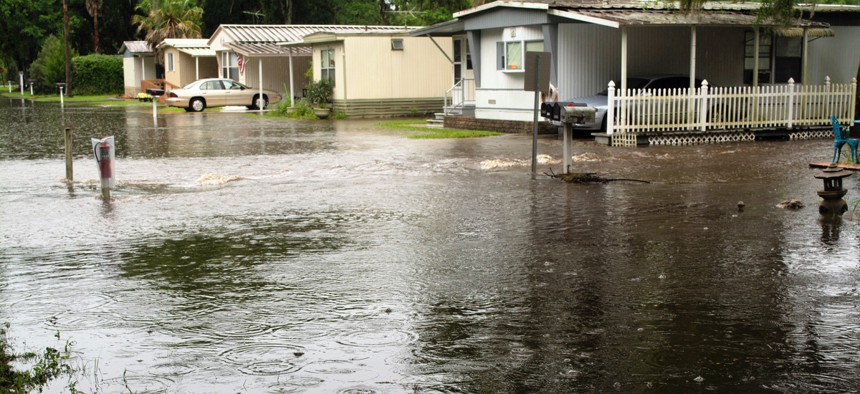Connecting state and local government leaders
By the end of the century, the number increases to 2.5 million at-risk properties.
More than 300,000 coastal properties in the United States are at risk of chronic and disruptive flooding within the next 30 years—the length of a typical mortgage.
Those numbers are expected to rise dramatically by 2100, according to a report from the Union of Concerned Scientists.
“By the end of the 21st century, nearly 2.5 million residential and commercial properties, collectively valued at $1.07 trillion today, will be at risk of chronic flooding,” says the report, titled Underwater: Rising Seas, Chronic Floods and the Implications for U.S. Coastal Real Estate.
The report estimates the number of properties that will be subjected to chronic, disruptive flooding, defined as flooding that occurs at least 26 times per year. Researchers brought together existing flood projections for coastal regions and property data from Zillow, an online real-estate company. The findings indicate that flooding, exacerbated by sea-level rise and driven primarily by climate change, will place hundreds of thousands of properties and communities at risk “even absent heavy rains or storms.”
But despite the known risks, most real-estate and development markets in coastal cities remain unprepared, the report concludes.
“Even in places such as Miami-Dade County, which is already experiencing disruptive tidal flooding, the real estate market is only just beginning to adjust,” the report says. “Other smaller, less in-demand locations, such as in coastal Louisiana and the eastern shore of Maryland, are already facing a chronic flooding reckoning.”
The report’s results are based on a scenario of high sea-level rise, projecting 6.6 feet of global sea-level rise by 2100. Researchers said it’s an “appropriately conservative projection to use when estimating risk to homes, which are often the owner’s single biggest asset.” The findings do not account for future population shifts or additional development.
Using that scenario, researchers found that “within the next 15 years roughly 147,000 existing homes and 7,000 commercial properties—currently worth $63 billion—are at risk of being inundated an average of 26 times per year, or more.” The report describes flooding that ranges from water swamping roads and yards to creeping into homes and businesses, which combined would make areas "effectively unlivable."
By 2045, the number rises to 311,000 residential properties, ballooning to 2.4 million by the end of the century. Those properties are estimated to currently house about 4.7 million people, equivalent to the entire population of Louisiana.
All 23 coastal states are at risk, and low-income areas and communities of color may harbor additional risk.
The states with the most to lose are Florida and New Jersey, home to some of the most developed land in the country. Within the next 30 years, roughly 64,000 homes in Florida and 62,000 in New Jersey will be at risk of chronic flooding.
In Florida, Miami Beach accounts for more than 12,000 of the at-risk properties. By the end of the century, Florida alone could account for more than 40 percent of the at-risk homes in the nation. In New Jersey, 10 beach towns are projected to have at least 1,500 at-risk homes by 2045. Ocean City tops that list, with more than 7,200 at-risk homes.
Along other parts of the coast, suburbs are more at risk than major metropolitan areas. Cities close to major hubs have seen prolonged development, the data shows, which may expose them to greater flood risk in the future.
For example, by 2045, the three counties that make up most of Long Island—Suffolk, Nassau, and Queens—could encompass nearly 15,000 homes at risk of chronic inundation. Today, there are roughly 40,000 people living in those homes, which are collectively valued at $7.7 billion. By contrast, in that same timeframe, Manhattan has no at-risk homes.
Nationwide, 175 communities can expect significant chronic flooding by 2045. Nearly 40 percent of those—or 67 communities—have poverty levels above the national average. The largest share of those is in Louisiana, where there are 25 communities with above-average poverty rates and 10 percent or more of the homes at risk by 2045.
The report also found increased risk to elderly homeowners on fixed incomes, blue-collar communities and commercial districts. Tourism revenue is also likely to take hits, mostly from the flooding risk posed to coastal vacation homes that are owned by one family but rented to others for multiple weeks each year.
The Union of Concerned Scientists says cities can prepare for the deluge by using accurate flood-risk data, informing homeowners and real-estate professionals of the hazards and shifting building and zoning codes, among other things.
Among those steps, most crucial is making floods risks better known to both real-estate professionals and homebuyers. That starts with the federal government, which draws up flood maps through the Federal Emergency Management Agency. But the report says the responsibility is shared by state and local policymakers, who can “disseminate flood-risk information to communities, and set local zoning and building regulations in line with these risks.”
There are three main strategies to cope with sea-level rise, researchers said: Defend, accommodate and retreat.
“Decisions about which combination of strategies to employ, and when and where, require expertise, stakeholder engagement, and ultimately the resources to implement the chosen options,” the report says.
But much of that help will have to come from the federal government, including working “with other nations to slow the pace and limit the magnitude of sea level rise through aggressive reductions in heat-trapping emissions, in order to allow as many communities and homes as possible—both at home and abroad—to avoid chronic inundation in the years ahead,” the report finds.
Kate Elizabeth Queram is a Staff Correspondent for Government Executive’s Route Fifty and is based in Washington, D.C.

NEXT STORY: NG911: Are we there yet?



